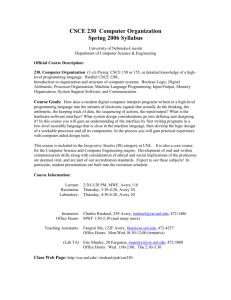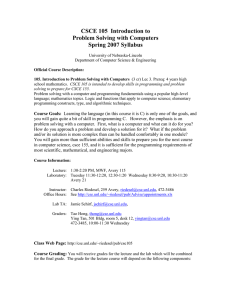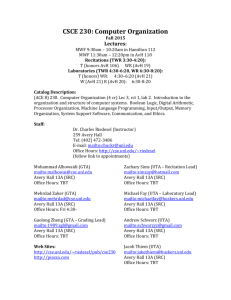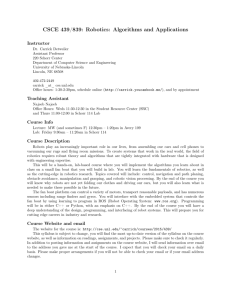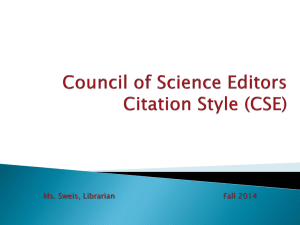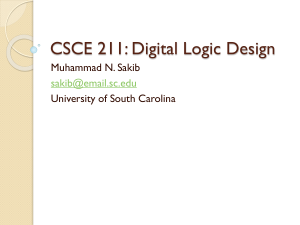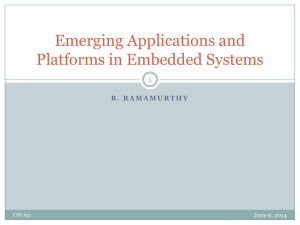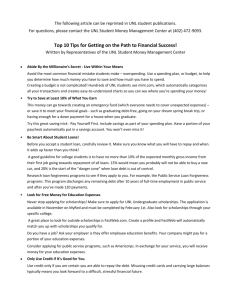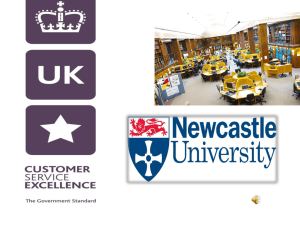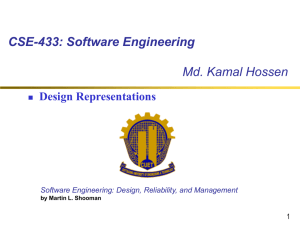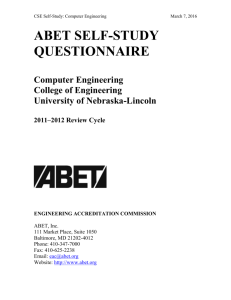CSCE230SyllabusFall2014 - Computer Science & Engineering
advertisement
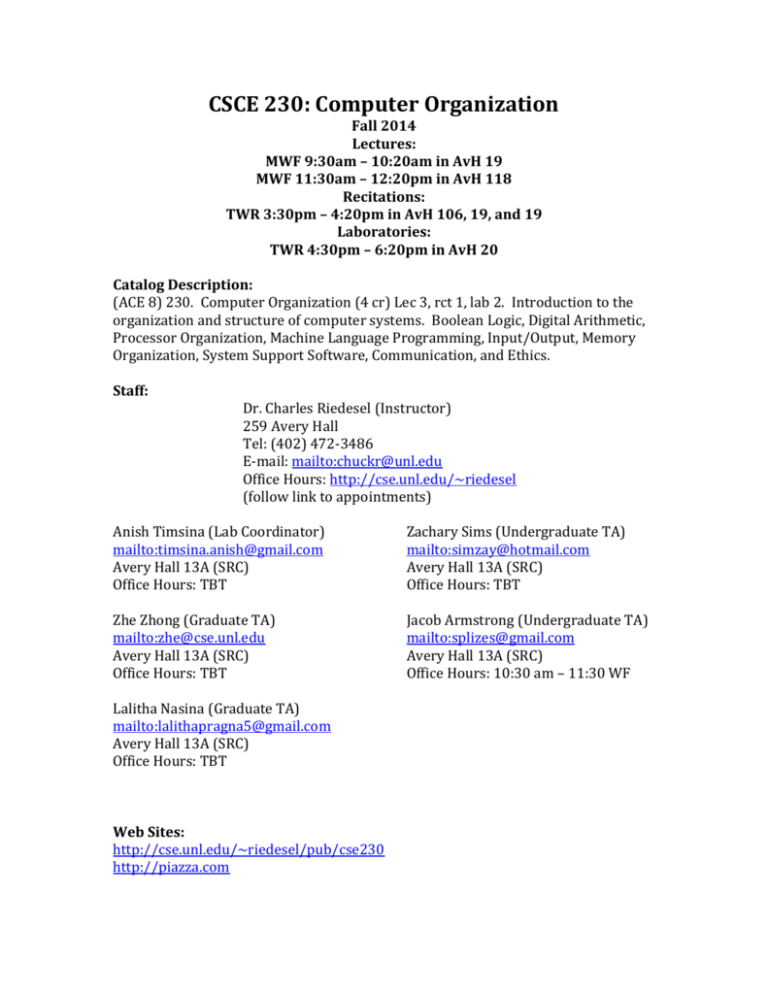
CSCE 230: Computer Organization Fall 2014 Lectures: MWF 9:30am – 10:20am in AvH 19 MWF 11:30am – 12:20pm in AvH 118 Recitations: TWR 3:30pm – 4:20pm in AvH 106, 19, and 19 Laboratories: TWR 4:30pm – 6:20pm in AvH 20 Catalog Description: (ACE 8) 230. Computer Organization (4 cr) Lec 3, rct 1, lab 2. Introduction to the organization and structure of computer systems. Boolean Logic, Digital Arithmetic, Processor Organization, Machine Language Programming, Input/Output, Memory Organization, System Support Software, Communication, and Ethics. Staff: Dr. Charles Riedesel (Instructor) 259 Avery Hall Tel: (402) 472-3486 E-mail: mailto:chuckr@unl.edu Office Hours: http://cse.unl.edu/~riedesel (follow link to appointments) Anish Timsina (Lab Coordinator) mailto:timsina.anish@gmail.com Avery Hall 13A (SRC) Office Hours: TBT Zachary Sims (Undergraduate TA) mailto:simzay@hotmail.com Avery Hall 13A (SRC) Office Hours: TBT Zhe Zhong (Graduate TA) mailto:zhe@cse.unl.edu Avery Hall 13A (SRC) Office Hours: TBT Jacob Armstrong (Undergraduate TA) mailto:splizes@gmail.com Avery Hall 13A (SRC) Office Hours: 10:30 am – 11:30 WF Lalitha Nasina (Graduate TA) mailto:lalithapragna5@gmail.com Avery Hall 13A (SRC) Office Hours: TBT Web Sites: http://cse.unl.edu/~riedesel/pub/cse230 http://piazza.com Prerequisites: Grade of “P” or “C” or better in any “flavor” of CSCE 155, or detailed knowledge of a high-level programming language. Prerequisites by Topic: Mastery of: mathematical problem solving skills, mathematical maturity and competence to the level of introductory calculus. Familiarity with: programming, logarithms, integer and floating point numbers. Exposure to: recursion, operating systems services. Textbook: Computer Organization and Embedded Systems, 6th edition, by C. Hamacher, Z. Vranesic, S. Zaky, and N. Manjikian, McGraw Hill, 2011. ISBN: 978-0073380650. Course Objectives: Mastery of: Boolean algebra, logic equations, binary numbers (including negatives), fixed-point binary arithmetic, hexadecimal notation, logarithms, exponential numbers. Mastery of: I/O devices, processor organization, instruction set architecture (with hands-on experience in micro-processor design and implementation). Familiarity with: logic gates and diagrams, floating point arithmetic, memory devices and hierarchies, micro-operations & micro-architectures. Familiarity with: assembler language principles, flow of control, stacks, subroutines, assemblers, linkers, loaders, the syntax & semantics of short assembler programs. Course Goals: How does a modern digital computer interpret programs written in a high-level programming language into the streams of electronic signals that actually do the thinking, the arithmetic, the keeping track of data, the sequencing of actions, and the input/output? What is the hardware-software interface? What system design considerations go into defining and designing it? In this course you will gain an understanding of the interface by first writing programs in a low-level assembly language that is close to the machine language, then developing the logic design of a workable processor and all its components. In the process you will gain practical experience with computer-aided design tools. Topics Covered: 1. Arithmetic and Logic Level: a. Boolean algebra, truth tables, logic equations, logic gates, combinational logic, sequential logic & memory devices, clocks, waveform diagrams 2. 3. 4. 5. b. Signed and unsigned binary numbers, floating point numbers, BCD, Hexadecimal, ASCII c. Signed and unsigned fixed-point arithmetic, floating-point arithmetic, ALU structures System Level Organization: CPU, memory systems (main memory, cache, virtual memory), storage technologies, I/O devices & processes (programmed, DMA, channel), busses. Micro-Architecture Level: data paths and components, micro-operations, memory interfacing, the fetch/execute cycle, processor control & sequencing, interrupts, rudimentary pipelining. Instruction Set Architecture Level: instruction types and formats, opcodes, operands, immediate values, addressing modes, flow of control, branching and procedure calls. Assembler Language Level: syntax, directives vs. instructions, assemblers, linkers, loaders, semantics of simple programs, stack management, procedure calls, interrupt handling. Policies: Late Work: All work must be completed when due and all tests/quizzes must be taken when given. Exceptions must be arranged in advance. Attendance: Attendance will be taken each class period and is factored into the grade. Excused absences may be possible for legitimate reasons. Academic Integrity: All students are expected to adhere to the policies stated in http://cse.unl.edu/ugrad/resources/academic_integrity.php. Cheating is a very serious offense and the CSE Department has laid down strict guidelines for dealing with this problem. The penalty for cheating may include an automatic F grade for the course and expulsion from the program. The Department requires me to report every offense to the Chair for further consideration. The key to avoiding cheating is to be totally open and transparent about any and all collaborations, noting that appropriate teamwork and collaboration will be highly encouraged and rewarded. Grading: Beginning this fall, CSCE 230 and CSCE 230L (the lab) have been merged into a single 4 hour course. The lab grade will now contribute to the overall course grade. (15%) Homework: Recognizing that peer study is an effective learning tool, you are encouraged to work in groups to discuss the homework but be sure to write your own solutions and indicate whom you worked with. The ability to solve homework problems will pay off in other components of the course grade. Some assignments given in the Recitation may also count as homework. On average you can expect homework to be assigned every other week, and they will be due at the beginning of class in one week. One of these homework assignments will be extensively on analysis of real-life ethical dilemmas, in compliance with ACE outcome #8. Another homework assignment involves an individual oral presentation on a topic dealing with broad historical and societal issues related to the computer technology. This is also in compliance with ACE outcome #8. (15%) Laboratory: The lab section will provide supplemental learning to the material covered in lectures, and give you hands-on practices along with better understanding of what you’ve learned at lectures. There are three major parts in the lab section: assembly programming, logic design, and a group project. There will be 8 lab assignments (subject to change) to guide the lab section, one per week, before the group projects. Each lab assignment has specific objectives and tasks. The final group project will be assigned after these lab assignments, details will be given later, it’s basically about implementing a processor on a FPGA board. What to Do Before Lab Each lab assignment has a pre-lab section, which helps you get prepared for the lab section. The pre-lab section normally involves reading materials (mostly the textbook), answering questions, or working out parts of the design that will be used in the lab section. The pre-lab section is included in each lab assignment, and is required to submit at the beginning of each lab in paper. What to Turn in At the beginning of each lab: pre-lab assignment in paper. Print it out from Blackboard and complete it before labs. After each lab: codes, questions or other files required to finish the task in lab assignment. Hand in files through CSE web handin system: http://cse.unl.edu/~handin/. Different lab assignments have different requirement at this part. The due time of this part will be shown in the handout of each lab. Grading Each of the 8 labs is worth 100 points, 800 points in total. The distribution of points on each part can be found at the lab assignment. No making up for missed lab, or late assignment beyond one day after the deadline, except for valid excuse and appropriate notices in advance. Late assignment within one day after the deadline or incomplete submission (submit wrong files or incomplete files) will get 10 points off each time. The group project will be worked on during lab time, but the grading will be in its own category (see next). (20%) Group Project: Completed in groups, the project will involve the design, implementation, and testing of a processor implementing a subset of the instructions found in modern processors. You will be asked to complete several component parts before integrating them into your final design. The project provides an excellent opportunity to put into practice what you will learn in this course and the associated lab. Each group will be asked to make a written and oral report of the work done for the project. The technical report must address societal impact of the design, and the process of writing the technical report and project design must adhere to professional ethical codes (e.g., IEEE standards) in terms of correct credit acknowledgements, proper citations of previous designs and algorithms, and responsible team management and evaluation. These components are in compliance with ACE outcome #8. (20%) Tests: These will be generally aligned with chapters of the textbook and announced at least a week in advance. Tests for some chapters may be combined or included in the final examination to save class time. (3%) Quizzes: These very short pop quizzes are intended to provide feedback to me (and you!) about how well you are understanding the material being discussed in the class. If you consistently perform poorly in these, I expect you to seek extra help from me or the TAs. (20%) Final exam: This will be a comprehensive exam given during the scheduled time for this course. The scope will be announced during the last week of classes. (2%) PAT: As part of CSE's assessment of its academic programs, every student in this course must take a Progress Assessment Test (PAT) at the end of the semester. Some time between Wednesday of the fourteenth week of classes (December 3) and Wednesday of the fifteenth week of classes (December 10), you will take the PAT via a web browser in Blackboard. The PAT consists of 30-40 multiple choice questions based on content of this course. This exam will count towards 2% of your final grade, in a participatory fashion (you will get full credit for taking it). (5%) Attendance and Participation: You may earn credit for Effort (seeking help, attending recitations, completing all homework, doing well in pop quizzes), Participation (attending lectures, asking good questions in class, doing the surveys for the research being done – see below), and Altruism (helping others in recitation or by posting responses to questions through Piazza; bringing to my attention good websites, animations, etc. that would enhance the classroom experience for this course). Below is the grade distribution for those who like tables: No. 1 2 3 4 5 6 7 8 Description Percentage (Individual) Homework 15% (Team) Laboratory 15% (Team) Group Project 20% (Individual) Tests 20% (Individual) Quizzes 3% (Individual) Final Exam 20% (Individual) PAT 2% (Individual) Attendance and Participation 5% Final grades will be assigned based on the following cutoff percentages: Grade A+ A A- B+ B BC+ C CD F Score 97 93 90 87 83 80 77 73 67 60 <60 Students with Disabilities: Students with disabilities are encouraged to contact the instructor for a confidential discussion of their individual needs for academic accommodation. It is the policy of the University of Nebraska-Lincoln to provide flexible and individualized accommodation to students with documented disabilities that may affect their ability to fully participate in course activities or to meet course requirements. To receive accommodation services, students must be registered with the Services for Students with Disabilities (SSD) office, 132 Canfield Administration, 472-3787 voice or TTY. ACE Compliance This course includes material to help satisfy ACE Student Learning Outcome (SLO) #8 on ethics, civics, stewardship, and their importance on society. Aspects of these topics are woven into (a) a homework assignment requiring analysis of real-life ethical dilemmas (b) the technical report of the group course project on the design and implementation of a central processing unit, and practice of the code of conducts (civics) in teamwork and research-and-development of project solution, and (c) an individual oral presentation on a topic dealing with broad historical and societal issues related to the computer technology, providing stewardship training regarding responsibilities as an engineer. These topics are as important as the technical material you learn in the course. As a practicing computer scientist or computer engineer you will need to master both technical approaches and an understanding of your responsibilities to society in using those approaches (stewardship). As part of the overall course grade, you will be assessed on your participation in discussions, your project report demonstrating best practices in communication and professional ethics, your code of conduct (civics) in designing solutions and in working with your peers and superiors, and stewardship. ACE 8 credit is no longer relevant, as this course contributes only 1 hour, and full ACE 8 credit can now be earned in the expanded 3 hour CSCE 486 or 488. Other Items: The CSE Department has an anonymous contact form that you may use to voice your concerns about any problems in the course or department if you do not wish to be identified. See http://cse.unl.edu/contact-form. It is CSE Department policy that all students in CSE courses are expected to regularly check their email so they do not miss important announcements. TA office hours are in the Student Resource Center (SRC) which is at Avery 13A. See http://cse.unl.edu/src This syllabus may be updated and expanded as the semester progresses. The recitation may cover material essential for the lab of that week. Therefore it is very important to schedule your recitation on the same day or an earlier day than the lab. UNL has received federal funding to continue the design and implementation of Creative Competency Exercises designed to improve computational and creative thinking in courses at the University of Nebraska. This semester evaluation will be done in the class to help understand how doing these exercises impacts student learning and student attitudes and motivation for science, engineering, technology and math courses. Faculty from CSCE and Educational Psychology will be coming to class or lab to proctor surveys that will aid in this evaluation. You will be getting more information from them during the first or second week of the semester. Thank you in advance for your help with this important project.
